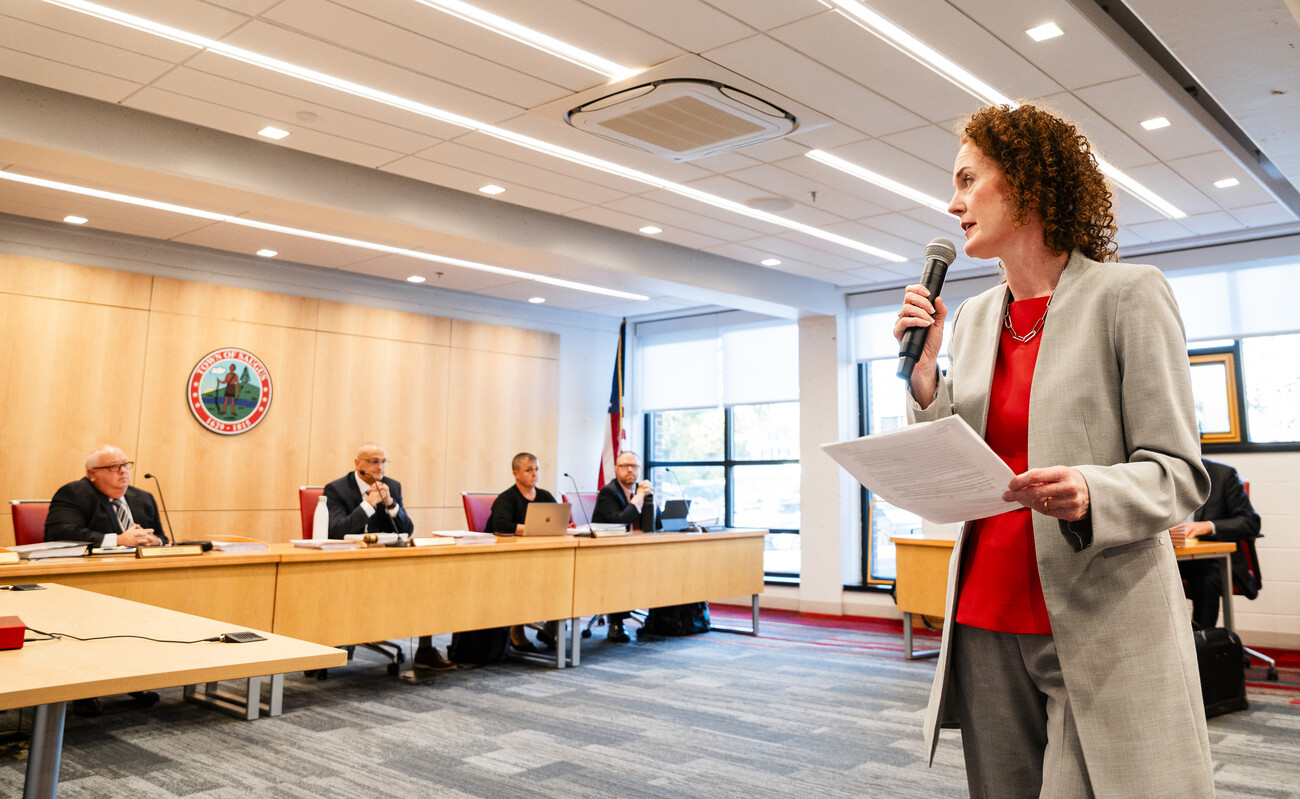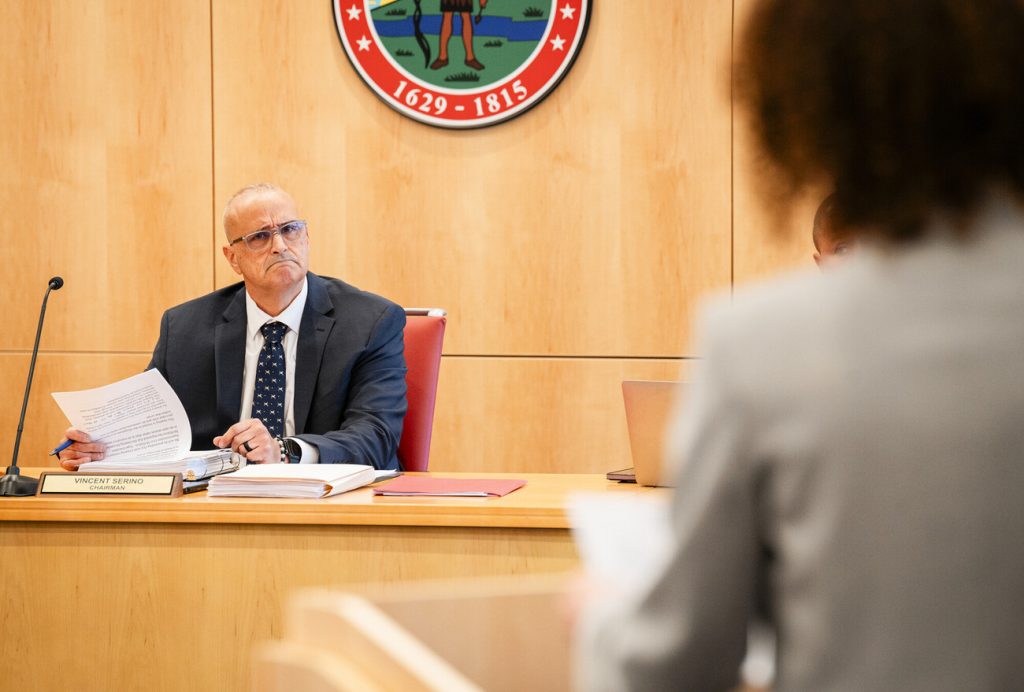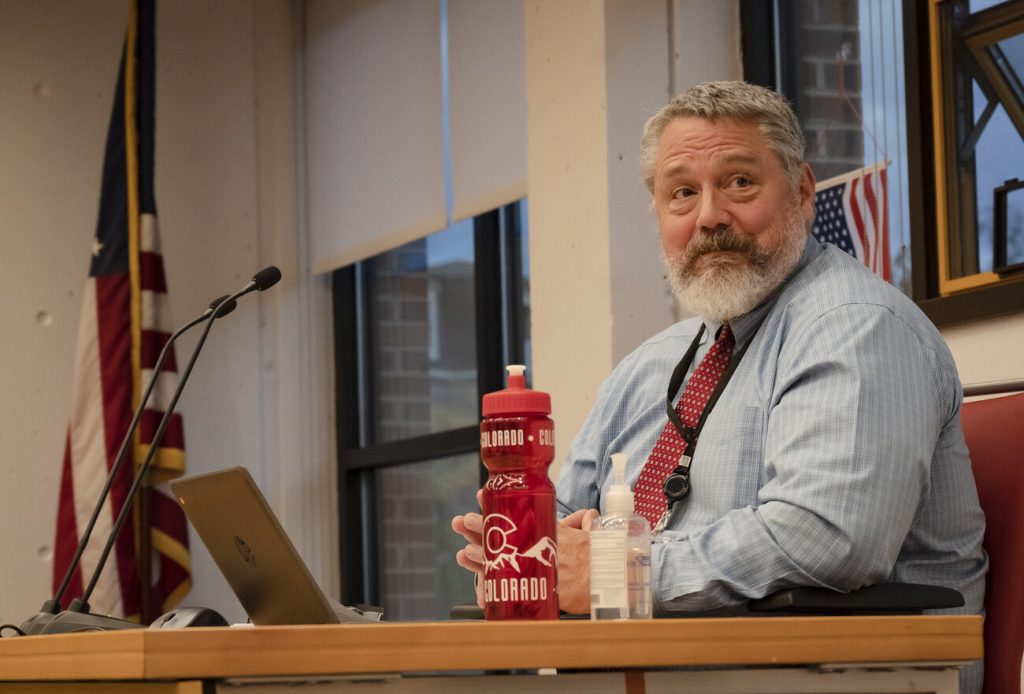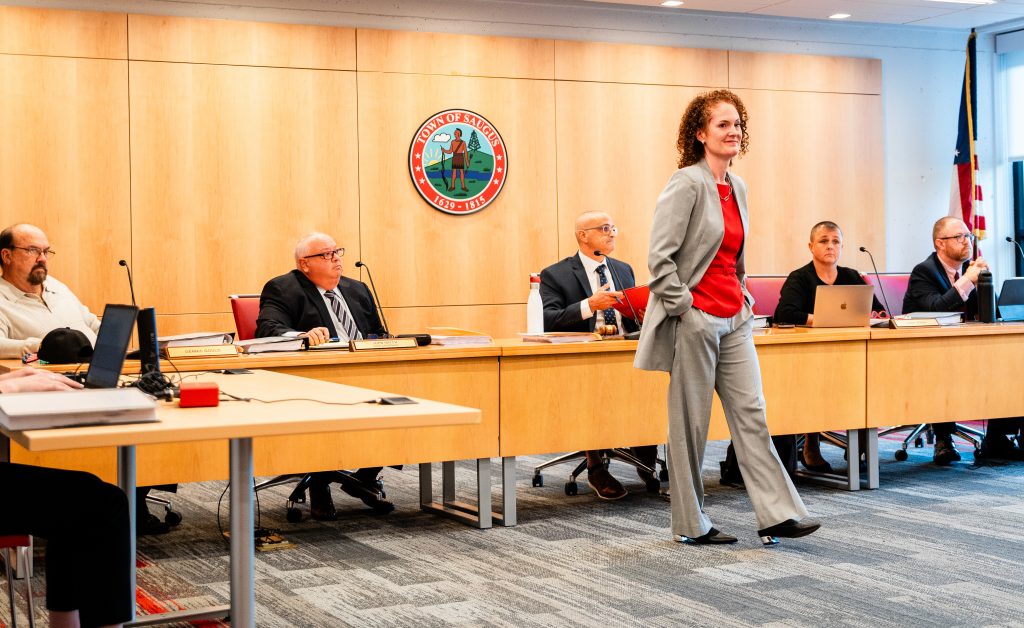

[ad_1]
SAUGUS — A sprawling report produced by law firm Arrowood LLP following an investigation into former Superintendent Erin McMahon’s conduct reveals both the reasons why the School Committee felt it necessary to terminate McMahon in the third year of a five-year contract and the origins of the investigation that ultimately proved to be the downfall of the district’s first female superintendent.
The Item obtained a copy of the report, which was completed in August, with a transcript of McMahon’s testimony before an investigator attached, in response to a public-records request. Attorney Michael Long, who represented McMahon leading up to her termination, also provided the paper with a copy of the exhibits McMahon submitted to the School Committee as a rebuttal to the report. The committee did not review the materials before terminating McMahon earlier this month.
School Committee Chair Vincent Serino said if those exhibits were critical to understanding the charges against McMahon, they would have been submitted to the committee ahead of the meeting where she was ultimately terminated. Serino said he read the materials and stood by the decision.
The investigation into McMahon’s conduct was spurred by complaints made by former Deputy Superintendent Margo Ferrick to Attorney Howard Greenspan, who represents the committee, in January. Investigators felt Ferrick did not have an ulterior motive in submitting the complaints about McMahon, noting her ultimate departure from the district for the superintendent post in Georgetown. Additionally, Ferrick was not named acting superintendent when McMahon took leave in January, although she was a finalist for the job that ultimately went to McMahon.
Ferrick alleged that McMahon “engaged in self-dealing or had conflicts of interest in the selection of a certain professional development provider for the school district, engaged in fraudulent activity in the payment of invoices to a certain professional development provider for the school district, inappropriately used grants funds, and had a significant amount of time spent away from the district.”
Attorney Megan Deluhery, who is representing McMahon, said she and other attorneys representing the former superintendent only received a copy of the full report after the committee voted to terminate McMahon’s contract. Deluhery slammed the report as “incomplete, inaccurate, and misleading.”
“Ms. McMahon was guided by one purpose as Superintendent: what is best for the students of Saugus Public Schools. The School Committee did not follow that same mandate when it considered how to address Ms. McMahon’s performance and tenure,” Deluhery said.
After the committee received the complaints from Ferrick, it convened in executive session on Jan. 19, where it voted to empower Serino to hire an outside firm to investigate those complaints into McMahon. McMahon and Long had alleged that the investigation was improperly rerouted to Town Manager Scott Crabtree’s office by the School Committee, an allegation undermined by the fact that Crabtree’s office contracted Arrowood in February only because the town manager has the sole power to do so under the town charter.
“The town manager shall have authority… to employ special counsel to assist the town counsel whenever in his judgment it may be necessary,” Article 2, Section 13 reads.
McMahon and her attorneys also argued that Arrowood was not an impartial investigator, pointing to the fact that it has regularly done work on the town’s behalf in the past.

The report lays out in great detail the supporting evidence behind the initial areas of concern with McMahon’s performance brought before the committee in January.
McMahon’s alleged conflicts of interest stem from her relationship with Relay Graduate School of Education, which she contracted to conduct professional development for the district, and later employed her to do consulting work for which she received compensation. McMahon also received gratis professional development training from Relay, which she failed to disclose in either a conflict-of-interest declaration she filed in April, the day she was set to be interviewed for the investigation, or in conversations with the committee. The report also undermines McMahon’s claim that she notified both committee chairs who served during her tenure — Tom Whittredge and Serino — about her work with Relay.
McMahon testified that she notified both men of the work orally, but neither Serino nor Whittredge told investigators they recalled any such conversations, and the report notes that McMahon had typically offered written notice of absences. The report credits Whittredge’s recollection because he recalled discussing McMahon’s other professional obligations, like teaching at Columbia University, with her. Offering just oral notice was “inconsistent with her past practice,” the report says.
By consulting for Relay at the same time the town was paying the school, McMahon appears to have violated Article 2, Section 33 of Saugus’ town charter, which states, in part, “it shall be unlawful for… any… appointive official… directly or indirectly to make a contract with the town, or to receive any commission, discount, bonus, gift, contribution, or reward from, or any share in the profits of, any person or corporation making or performing such a contract,” unless they notify the selectmen in writing of the contract and the nature of their interest in it. The charter also instructs any official who does so to abstain from doing any official act on behalf of the town in reference to said contract. By receiving a commission from Relay, which was actively engaged in work for the town, and failing to notify the selectmen, McMahon appears to have violated the provision.
“At a minimum, Superintendent McMahon’s acceptance of consulting fees and gratis professional development training from a professional development provider that the district subsequently contracted with in the amount of $56,000, gives rise to the appearance that Superintendent McMahon was improperly influenced to do business with Relay as a result of her own financial interest,” the report reads.
In the disclosure, which McMahon filed well after the consulting work, McMahon writes she brought Relay to the district to aid in its recovery from a scathing 2019 Department of Elementary and Secondary Education report that found myriad flaws in Saugus’ approach to teaching and learning. McMahon wrote she had seen first-hand the impact of Relay programming when she worked in the Denver Public Schools system and sought the same results in Saugus.
[The] dynamic was horrible”
A Saugus Public Schools employee describing the working environment under former Superintendent of Schools Erin McMahon.
Deluhery said anyone with a concern about McMahon’s relationship with Relay, as with the other accusations she faces, should have brought them to her.
“No one did,” she said.
Key to the allegations against McMahon is the relationship between the district and Excellence Reflex Consulting, which McMahon allegedly allowed to overcharge the district by nearly $5,000 for consulting services and expenses, at times in violation of federal law. McMahon, according to the report, allowed consultant Chi Tschang to bill the district for alcohol, an expense paid out with the use of Title I grant money. Executive Director of Finance and Administration Pola Andrews notified McMahon of the charge for alcohol, which McMahon said she would speak to Tschang about. The report does not lay out what happened next.
Tschang, in an affidavit submitted to the committee by McMahon’s camp, said he intended to remove the line item for alcohol from his invoice but reduced his bill by $3 rather than $13 — an oversight he said he sought to remedy.
Still, Title I grant money, which was being used to pay for Tschang’s services, cannot be used for the purchase of alcohol.
McMahon recruited Tschang to the district to provide additional professional development services — specifically for both weekly planning and weekly data meetings she sought to implement. He was initially contracted to conduct 36 hours of professional development training during the course of four days, at a cost of $300 per hour not including travel expenses (McMahon testified she believed the district was not obligated to pay for travel costs while Tschang indicated he intended to bill Saugus for those expenses). The total cost of the contract agreed to by McMahon and Tschang was $9,999, the district’s remaining Title I grant balance.
In her testimony, McMahon said that figure was just an estimate.
At particular issue in the report is Tschang submitting invoices to the district as a “daily rate,” not submitting itemized expenses but instead a lump sum reflecting what he was owed. McMahon testified she did not instruct Tschang to do so, contradicting Ferrick’s testimony, who said she asked Tschang to submit the invoices as a daily rate at McMahon’s request.
Tschang in October 2022 submitted an invoice reflecting 25 hours of work at the $300 hourly rate, along with roughly $2,800 in expenses. In November, he resubmitted that invoice, but it now reflected 38 hours of consulting work and did not include any expenses, though receipts were attached in a spreadsheet. McMahon said she did not know why the amount of hours changed between invoices.
Ferrick testified that payments to Excellence Reflex Consulting exceeded the typical daily rate paid to other consultants.
In November, the committee “became aware” of allegations of abusive behavior against Tschang stemming from his time as the principal at KIPP Academy in Fresno, Calif. between 2003 and 2009. As a result, the committee, concerned about both Tschang’s alleged behavior and the high sums paid to consultants, briefly stopped signing bills including money set to be paid to Tschang.
Later that month, McMahon wrote that Tschang would fulfill his contract on Dec. 14 and no longer conduct work for the schools. McMahon testified she later told Serino she would like to extend Tschang’s contract through January to complete previously scheduled professional development. Serino did not recall any subsequent conversations with McMahon about extending Tschang’s contract.
In December, McMahon asked Tschang to submit a revised invoice for his November work, telling him he worked 28 hours, not 24, as he had billed the district. McMahon testified she was uncertain what prompted the increase.
Tschang submitted a final invoice to the district in January, purporting to reflect his December work. That invoice sought payment for $1,650, reflecting five and a half hours of consulting work at a rate of $300 per hour. Later, on Jan. 4, he submitted a revised invoice directly to McMahon seeking payment for seven and a half hours of work and total payment of $2,250. Tschang was ultimately paid $2,250 for his December work.
“Given that the earlier invoice… purported to contain all of Mr. Tschang’s December time for the district, it can reasonably be inferred that the revised invoice reflected additional time that Mr. Tschang spent working in January, but which was not approved by the School Committee, and was therefore added to the December invoice,” the report reads.

Tschang communicated solely with McMahon regarding his invoices aside from the first and final ones he submitted, according to the report.
“It is reasonable to infer that Superintendent McMahon either knowingly encouraged Mr. Tschang to modify his invoices such that (they) had higher hours reported in order to encompass expenses, or negligently failed to inspect or otherwise investigate blatantly fraudulent invoices before approving said invoices for payment by the district,” the report reads. “That Superintendent McMahon elected to manage these invoices personally… rather than have Mr. Tschang provide his invoices to accounts payable consistent with district policy tends to support an inference that she knowingly encouraged him to modify his invoices.”
In all, the district paid Tschang through his company $24,283.89, nearly two and a half times the initial amount agreed to in the contract. The report alleges that Tschang was overpaid by $4,583.89, which investigators said reflects the amount paid in excess of the hours he set forth in initial invoices.
McMahon testified she and Ferrick both communicated with Tschang and she generally inspected all of the district’s consulting and vendor invoices.
The report notes the district paid significantly higher totals for professional development under McMahon than it had previously. In fiscal year 2022, for example, the district spent $122,568 — an increase of $71,871, according to the report. And, in fiscal year 2023, between July 1 and January 31, Saugus spent $222,546 — an increase of $171,849 from fiscal year 2021.
During fiscal year 2022, McMahon spent 35 days out of the district between professional development, vacation, personal, and sick days combined, according to the report. McMahon’s contract does permit her to pursue professional development opportunities, and the committee was aware of both her pursuit of a doctorate at Boston College and teaching obligations at Columbia when she was hired.
In FY23, between July 1, 2022 and Jan. 19, 2023, when she went on leave, McMahon used two personal days, 11.5 vacation days, four full days of sick leave, and 22 full days and two half days for professional development, totaling 40.5 days out of the district.
75.5
Former Saugus Superintendent of Schools Erin McMahon spent more than 75 days away from the district during her tenure.
Beyond those absences, McMahon was difficult to reach outside of normal business hours, according to the report.
Ferrick recalled an instance where the Veterans Early Learning Center had no electricity, and she was unable to reach McMahon to notify her of the situation prior to school starting, ultimately making the call to close the school herself. Committee Vice Chair John Hatch recalled a similar situation where he was unable to reach McMahon regarding “time-sensitive” needs related to buses for the girls’ soccer team’s travel to finals.
Ferrick also reported observing McMahon taking board meetings unrelated to her role as superintendent during school hours, and the report finds McMahon attended meetings during the school day for Leading Now, which Ferrick said were unrelated to work in Saugus, on Oct. 18, Nov. 4, Nov. 18, and Dec. 13, 2022.
The report also found concerns about McMahon’s treatment of her subordinates during her tenure, including one instance when she allegedly asked Saugus Middle/High School Principal Brendon Sullivan if he had ADHD during a meeting. McMahon testified she did not recall doing so, but the report indicates other employees recalled Sullivan making contemporaneous complaints about the incident and ultimately credited his recollection.
Andrews told investigators that McMahon periodically contacted her while she was on intermittent leave pursuant to the Family Medical Leave Act, expecting immediate responses.
“She felt that Superintendent McMahon asked probing questions intended to determine where (she) was, that the calls made her ‘uncomfortable’ and that the calls occurred in ‘non-emergency situations’ for the district,” the report reads.
McMahon did not have specific recollections of doing so, but said she only would have if Andrews had given her permission to contact her if she needed anything.
McMahon also allegedly engaged in “retaliatory conduct or promoted an atmosphere pervaded by concerns of retaliation,” the report found.
A senior accounts payable clerk described the work environment under McMahon as “really toxic” and “hostile,” and said the “dynamic was horrible,” according to the report. McMahon also allegedly threatened to strip the clerks of summer hours, which the clerk said was outside her authority. At one point, Executive Director of Curriculum Susan Terban began crying when asked about the working conditions under McMahon, calling them “tough.” McMahon allegedly initiated multiple “investigations” into various staff members based on perceived issues, according to Andrews.
Serino, the chair of the committee, said there was no specific charge in the report that carried more weight than another, but the cumulative impact of the alleged misdeeds left committee members, three of whom hired McMahon in 2021, with no choice.
“I think the committee as a whole likes Erin McMahon,” he said. “This isn’t something that was planned … we didn’t want this.”
“At the end of the day we did the right thing,” Serino added. “I think we can all sleep at night.”

[ad_2]
Source link
24World Media does not take any responsibility of the information you see on this page. The content this page contains is from independent third-party content provider. If you have any concerns regarding the content, please free to write us here: contact@24worldmedia.com

Large part of Lynn Woods remains closed

Swampscott water tests lead-free – Itemlive

Mother needs help providing the Christmas experience

A cheerful fundraiser for Saugus team

Carl Daniel Reiter – The Suffolk Times

Joan Ann (Woessner) Polywoda – The Suffolk Times

Thomas L. Lewick – The Suffolk Times

Jeanette Howard – The Suffolk Times

Nina Mazzaferro – The Suffolk Times

Lynn mayor announces re-election bid

BARRETT: They ate plenty – Itemlive

Brooke Moloney, the Minutewoman – Itemlive